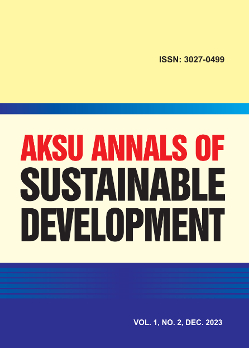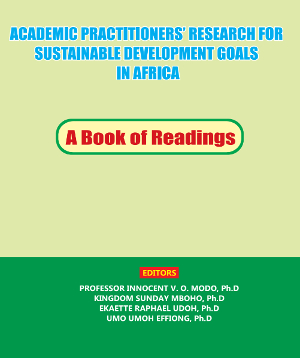PUBLIC ADMINISTRATION POLICIES AND EFFECTS ON NIGERIAN ECONOMY
DOI:
https://doi.org/10.60787/AASD-v2i1-31Abstract
The study appraises the effects of selected public administration policies on Nigerian economy. The study uses both descriptive and exfacto design. The techniques adopted include the Augmented Dickey Fuller (ADF) test, and Autoregressive Distributed Lag (ARDL) model for the data analysis. The study uses an ex post facto research design and collected data from the World Bank Development Indicators, Central Bank of Nigeria, Transparency International and National Bureau of Statistics of various years. The study finds that selected public administration policies in this study proxied by effective governance index, corruption control index, quality budgetary and financial management index and public administration index, has not significantly impacted GDP growth rate to enhance economic growth and hence development in Nigeria. It is equally revealed in the study that some of the policies have a non-significant impact on economic growth in Nigeria. The study adopted Keynes General Equilibrium and Rent-seeking Theories as its framework. The study further reveals that corruption has significantly impeded economic growth in Nigeria though with a weak transmission effect through foreign direct investment, domestic investment, and government spending in Nigeria. Base on the above findings, the study recommends that sound micro and macroeconomic policies should be provided in Nigeria and these policies will direct both fiscal and monetary policies positively, as this is noted to have positive impact on government expenditures and hence on economic growth. This the study also recommends that government should reduce the influence of external forces in the formulation of its public policies as such external directives may not work in Nigerian environment due to the differences in Nigerian socio-cultural background. The study further recommends that for corruption to be reduced, good, discipline and moral driven leaders who are honest with integrity should be appointed or elected to hold sensitive offices. The government should encourage and upgrade the anti-corruption agencies such as the Independent Corrupt Practices and other Related Offences Commission (ICPC) and Economic and Financial Crimes Commission (EFCC) to properly investigate corrupt practices, dispense appropriate sanctions on corrupt Nigerians, strengthen and reward institutions with good pedigree.
Downloads
References
Atairet, A.C. (2020). Implementation of Local
Economic Empowerment Strategy (LEEDS)
in the health and Education Sectors. Akwa
Ibom state, Nigeria- An Assessment.
International Journal of Technical
Research & Science. Vol. X.
Apeh, I.E. (2013). Introduction to community
development: revised edition. Ugbokolo:
Supreme 1(1)
Ade, A. O., Babatude, H. & Awoniyi, M. A. (2011).
The Relationship between Corruption,
Foreign Direct Investment and Economic
Growth in Nigeria. An empirical
investigation. Journal of Research in
International Business and Management,
(9), 278-292.
Adenike, E. T. (2013). An econometric analysis of
the impact of corruption on economic
growth in Nigeria. E3 Journal of Business
Management and Economics, 4(3): 054-
Adewale, S. B. (2011). The crowding-out effects of
corruption in Nigeria: An empirical study.
Journal of Business Management and
Economics, 2(2): 059-068
Alfada, A. (2019). The destructive effect of
corruption on economic growth in
Indonesia: A threshold model. Heliyon,
(10)
Anifowose, R. and Enemuo, R. (eds.) (1999).
Elements of politics. new edition. Lagos:
Sam iroanusi publications.
Asom, S. T. &Ijirshar, V. U. (2017). The impact of
corruption on economic growth and
cultural values in Nigeria: A need for value
re-orientation. CARD International Journal
of Management Studies, Business &
Entrepreneurship Research. 2(1): 91-113.
CBN (2022) central bank of Nigeria,
http://www.centralbankofnigeria
Dike, V.E. (2005). Corruption in Nigeria: A new
paradigm. African Economic Analysis.
Available @ www. African Economic
Analysis.org.
Daniel, U. S. (2023). Population Growth and Social
Services Provisions in Uyo Senatorial
District of Akwa Ibom State Nigeria Ph.D
Thesis. Publish by Research Gate, 2023.
DoI: 10.13140/RG.2/2.22420.48004. ISBN:
-978-60223-8-3
Daniel, U. S. (2023). An Assessment of National
Economic Empowerment and
Development Strategies in Uyo Local
Government Area M.Sc. Dissertation,
Researchgate, 2023. DoI:
13140/RG.2.2.32486.80960.
Efanga, J., Okon, U and Unyime, E (2023): Effects
of Economic Governance on Socio
Economic Development in Nigeria,
Journal of Scientific Research & Reports,
(5).
Effiong, U. U., (2024). Social Security in Nigeria. In
Destiny Eze Agwanwo (Eds.). Social Work
and Social Legislations in Nigeria. Prime
Publishers and Educational Services:
Ibadan.
Keynes (1936). The general theory of
employment, interest and money. The
Economic Journal 46(182), 238-253.
Nyagwui, N. E. (2017). Impacts of corruption on
economic growth in developing countries.
Seminar Paper. Philips Universitat
Marburg.
Obuah E (2010). Combating corruption in a failed
state: The Nigerian economic and
financial crime commission (EFCC).
Journal of Sustainable Development,
(1), 17-53.
Obuah E (2010). Combating corruption in a failed
state: The Nigerian economic and
financial crime commission (EFCC).
Journal of Sustainable development,
(1), 17-53.
Odeh A. M. (2015) The effects of corruption on
good governance in Nigeria. International
Journal of Development and Sustainability
(3).
Offiong, D.A. (1980). Imperialism and dependency.
Enugu: fourth dimension publishing ltd.
Ogundiya, S.I. (2009), “Corruption: the bane of
democratic stability in Nigeria”, current
research journal of social sciences, 2 (4).
Okorie, N. U.(2012). Global financial crisis;
consequences on the Nigeria Agricultural
Economy. Journal of Agricultural
Economics and Extensions Research
Studies (AGGEERS), 1(1):13-28.
Onakoya, A. B. & Folorunsho, I. I. (2015).
Corruption and economic growth nexus:
the Nigerian parody. Yobe Journal of
Economics, 2(2), 177-192.
Onakoya, A. B. & Folorunsho, I. I. (2015).
Corruption and economic growth nexus:
the Nigerian parody. Yobe Journal of
Economics, 2(2), 177-192.
publishers.
Saha, S. & Sen, K. (2019). The corruption–growth
relationship: Do political institutions
matter? WIDER Working Paper 2019/65.
Salisu, M. (2001), in Ezeani, E.O. (2005). “The
Nigerian civil service and national
development since independence: an
appraisal.” African journal of political and
administrative studies. 2,(1)pp.167-182.
Sambo, A. T. (2010), in Ukwenya, J. and Barki, E.
(2016). “Solar Energy Utilization: Key to
Sustainable Rural Development in
Nigeria.” Benpoly Journal of Science and
Technology.
Tanzi, V. & Davoodi, H. (1997). Corruption, public
investment, and growth. International
monetary fund, IMF working papers:
/139.
Transparency International (2020). Corruption
Index.
Transparency International (2021). Corruption
Index.
Transparency International (2022). Corruption
Index.
Udoh, U.S., and Madueke, O. (2018). Public
financial management and rural
development in Akwa Ibom State, 2008-
AKSU Journal of Management
Sciences, 5, (1).
Udoms, B. E., Atakpa, O. E., & Ekanem, P. (2017).
Democracy, Good Governance and
Economic Development Of Nigeria:
Challenges and Prospects. Uyo Journal
of Sustainable Development, 2(1), 35-
Vanguard Newspaper (Feb. 3, 2015). Nigeria
corruption rank.
Vieira, P. C. C. (2018). The Impact of Corruption
on Economic Growth, A Boot-Strapping
Analysis. FEP Working Papers No. 612.
FEP-UP, School of Economics and
Management, University of Porto.
Willie, C. E., Mboho, K. S. and Daniel, U. S. (2023).
Good Governance and Rule of Law for
Sustainable Industrialization in Nigeria
Academic Practitioner Research for
Sustainable Development Goals in
African; ICIDR Publishing
Downloads
Published
Issue
Section
License
Copyright (c) 2024 AKSU Annals of Sustainable Development

This work is licensed under a Creative Commons Attribution-NonCommercial-NoDerivatives 4.0 International License.
Manuscript content on this site is licensed under Creative Commons Licenses. Authors wishing to include figures, tables, or text passages that have already been published elsewhere are required to obtain permission from the copyright owner(s) for both the print and online format and to include evidence that such permission has been granted when submitting their papers. Any material received without such evidence will be assumed to originate from the authors.





 ICIDR Publishing House
ICIDR Publishing House